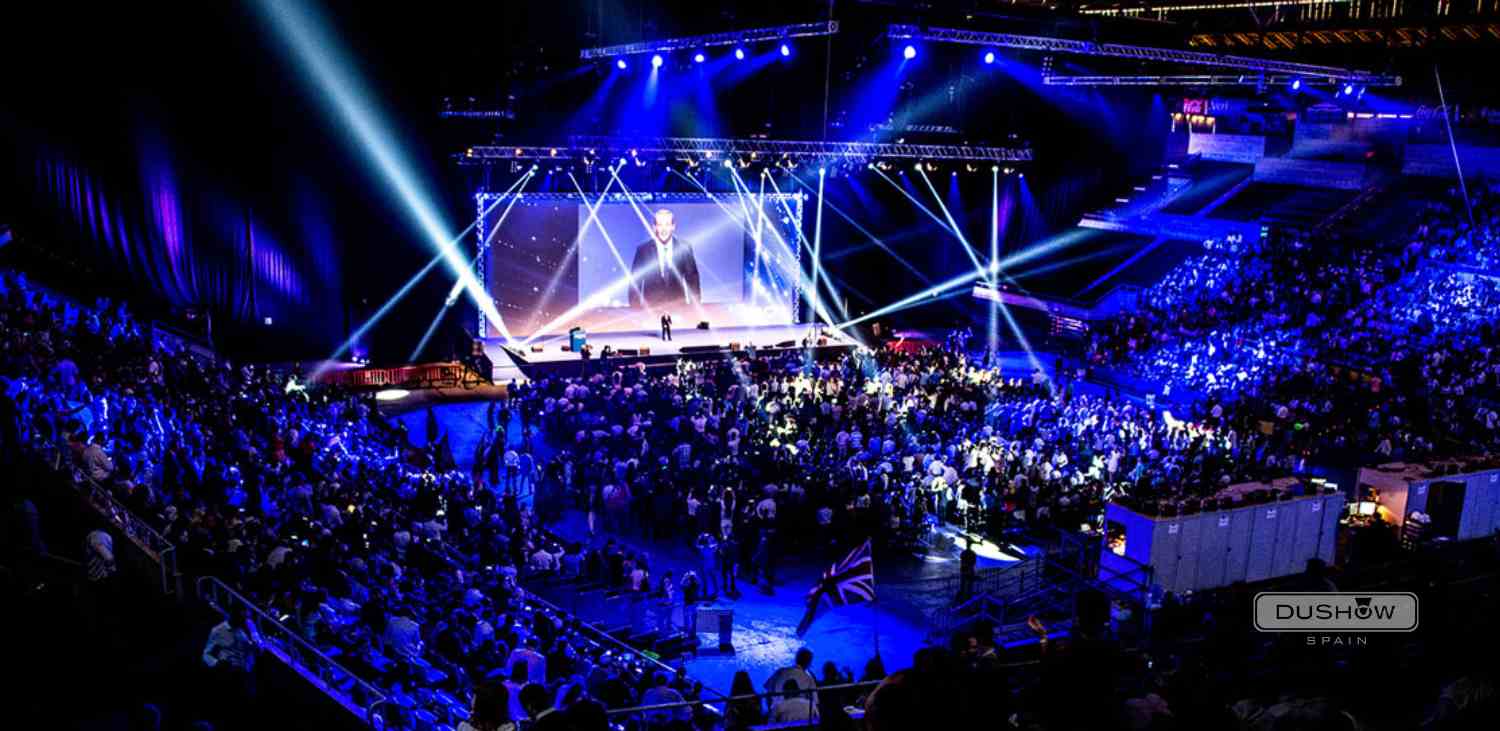How Event Production Works: A Comprehensive Look at the Process
Event production is a complicated and organized procedure that needs mindful planning and execution. It begins with developing clear purposes and comprehending the target audience. Each step, from budgeting to place selection, plays an essential function in making certain success. As the process unfolds, different aspects must align effortlessly. The nuances of this elaborate operation commonly go undetected. What are the crucial stages that add to a memorable event?

The Preliminary Preparation Stage
When beginning on event production, mindful preparation is vital to ensure a successful end result. The initial preparation phase works as the foundation for all succeeding initiatives. During this phase, event producers must specify the event's objective and objectives plainly. Recognizing the target audience aids tailor the experience and messaging, ensuring relevance and engagement.Producers should also take into consideration the event style, whether it be in-person, digital, or crossbreed, as this will certainly influence various logistical elements. Picking an appropriate day and location is essential, as it affects accessibility and availability.Furthermore, assembling a dependable team is fundamental for dividing obligations and enhancing interaction. Developing a timeline with turning points guarantees all jobs are completed on schedule. This stage entails extensive study, including identifying possible challenges and designing methods to reduce dangers. Eventually, a well-structured preliminary preparation stage establishes the tone for an effective event production journey.

Budgeting and Resource Allowance
In event production, reliable budgeting and resource allocation are critical for success - event production charlotte. Establishing financial parameters sets the structure for all subsequent decisions, while source circulation techniques assure that every component of the event is properly supported. Together, these components aid keep control over expenditures and enhance making use of offered sources
Developing Financial Parameters
Developing financial criteria is crucial to the success of any type of event production, as it sets the structure for efficient budgeting and resource allowance. This process starts with specifying the total budget, which includes all facets of the event, including location expenses, event catering, and advertising and marketing. By determining available funds, event coordinators can focus on expenditures and assign resources appropriately. In enhancement, it is important to perform thorough market study to expect potential expenses and identify funding resources, such as sponsorships or ticket sales. Developing clear financial parameters also help in danger administration, allowing coordinators to reserve backup funds for unforeseen costs. Inevitably, a well-defined budget functions as a roadmap, directing the event production group in the direction of accomplishing their goals while maintaining economic control.
Source Distribution Techniques
Reliable source circulation techniques are important for taking full advantage of the effect of an event while adhering to spending plan constraints. Effective event production needs a meticulous approach to budgeting and resource allocation. Organizers have to focus on crucial components such as place, catering, and technology, guaranteeing that funds are alloted to areas that boost guest experience. A detailed budget needs to detail expected expenditures and determine locations for potential cost savings, such as working out with suppliers or checking out sponsorship opportunities. In addition, tracking expenses throughout the planning process aids avoid overspending. By employing calculated resource distribution, event producers can provide a memorable experience while keeping monetary duty, eventually contributing to the general success of the event.
Location Selection and Logistics
Picking the best venue is vital to the success of any kind of event, as it sets the stage for the overall experience. Place option entails reviewing numerous elements, consisting of capability, availability, and location. Planners need to think about the target market and the nature of the event, ensuring the place aligns with the event's goals.Logistics play a significant duty in this procedure, entailing setups for seats, audiovisual tools, and providing solutions. A well-chosen venue should promote smooth flow for participants and staff, boosting engagement.Additionally, examining potential places for features like car parking, bathrooms, and fire escape is necessary for security and ease. The timeline for protecting the location is additionally important, as preferred locations might reserve promptly - event production charlotte. Complete preparation and prompt execution can eventually contribute to a seamless event experience, making place choice and logistics basic parts of effective event production.
Creative Principle Growth
While the place establishes the physical stage, creative idea development forms the event's identity and story. This process starts with determining the event's function and target audience, enabling event producers to develop a compelling theme that resonates with attendees. Brainstorming sessions often include diverse perspectives, promoting innovative concepts that line up with the event's goals.Once a motif is established, visual components such as shade combinations, signage, and decoration are developed to improve the total environment. Storytelling techniques might likewise be incorporated to produce an appealing journey for individuals, assuring an unforgettable experience. Additionally, factors to consider regarding entertainment, activities, and interactive parts are straightened with the selected idea, enhancing the style throughout the event.Ultimately, efficient imaginative idea development guarantees that every element of the event works cohesively, leaving an enduring impression on attendees and meeting the event's goals. This foundational work lays the foundation for succeeding planning and implementation stages.
Working together With Suppliers and Distributors
Effective event production hinges on efficient cooperation with vendors and suppliers. Picking reliable companions, bargaining agreements successfully, and making sure timely shipments are essential steps in this process. Each of these variables contributes this link considerably to the overall success and smooth implementation of an occasion.
Selecting Reliable Partners
Exactly how can event planners guarantee a seamless production experience? Selecting trusted companions is crucial in attaining this goal. Event coordinators need to perform detailed research study to determine vendors and distributors with a tested track document of excellence. This includes checking references, reviewing portfolios, and examining consumer feedback. Planners ought to prioritize companions that show professionalism and reliability, timely communication, and a readiness to collaborate. Structure strong relationships fosters trust fund and allows fast problem-solving throughout the event. In addition, it is useful to pick neighborhood suppliers that understand the place and regional logistics. Eventually, a successful event rests on the synergy in between coordinators and their partners, guaranteeing that every element of production runs smoothly and efficiently.
Discussing Contracts Efficiently
Effective arrangement of contracts is a crucial action in the cooperation between event planners and their suppliers and providers. This procedure involves clear communication of expectations, deliverables, and timelines. Organizers must perform detailed research on market rates and market criteria to develop a baseline for negotiations. It is crucial to create a joint ambience, motivating open discussion concerning terms, prices, and prospective contingencies. Organizers ought to additionally focus on comprehending the vendor's capacities and restrictions to align their demands efficiently. Flexibility can result in equally helpful contracts, cultivating lasting relationships. Crafting distinct contracts that include details efficiency metrics can aid guarantee liability, inevitably leading to effective event implementation and complete satisfaction for all celebrations entailed.
Making Sure Timely Shipments
Timely distributions are necessary for the smooth implementation of any event, needing attentive cooperation in between planners and their vendors and distributors. Reliable interaction is vital, as it helps establish clear expectations regarding shipment schedules, quantities, and details demands. Planners frequently develop comprehensive timelines to describe critical landmarks, ensuring all celebrations Read More Here remain straightened throughout the procedure. Routine check-ins with suppliers can assist identify possible hold-ups early, enabling proactive solutions. In addition, building strong partnerships with dependable providers fosters count on and responsibility, which can result in better solution and prioritization. By focusing on these collective efforts, planners can lessen disruptions, therefore boosting the general effectiveness of event production and making certain that all necessary materials and solutions show up as intended.
Marketing and Promo Approaches
While arranging an occasion, the success of advertising and promo techniques can considerably influence attendance and involvement. Effective techniques frequently include a mix of electronic advertising, typical marketing, and grassroots outreach. Utilizing social media sites systems enables real-time communication and targeted advertising, getting to specific demographics efficiently. Email marketing campaigns can even more engage prospective participants with personalized material and reminders.Collaborations with influencers or market leaders can likewise boost credibility and widen reach. Developing engaging material, such as video clips or blogs, aids to generate buzz and endure interest leading up to the event. Furthermore, leveraging early-bird discount rates and unique rewards can incentivize ticket purchases.Promoting with typical networks, such as posters or local media, continues to be relevant, particularly in community-focused events. A detailed approach that integrates multiple techniques assurances optimum visibility and engagement, inevitably adding to the event's success and the creation of a remarkable experience for guests.
On-Site Execution and Administration
On-site execution and administration are necessary parts that figure out the general success of an occasion. Effective control during the event assures that all components straighten with the prepared agenda. Event managers manage logistics, consisting of vendor control, devices configuration, and visitor solutions. Keeping track of timelines and attending to any type of unexpected problems are basic for preserving a seamless experience.The staff plays a substantial function, as experienced employees are in charge of different tasks such as registration, details circulation, and technical assistance. Interaction amongst group members is critical; it fosters a collective atmosphere and makes it possible for quick resolution of challenges.Additionally, safety and security protocols need to be stuck to, safeguarding the wellness of all guests. Post-event assessments are additionally component of on-site monitoring, giving understandings for Recommended Site future renovations. By concentrating on these elements, event producers can develop unforgettable experiences that satisfy or exceed participant expectations while accomplishing the event's purposes.
Regularly Asked Inquiries
How Do I Select the Right Event Style?
Picking the best event motif includes thinking about the target market, event objective, and venue. Investigating present trends and gathering input from stakeholders can likewise inspire innovative ideas that reverberate and produce a memorable experience.

What Are Typical Blunders in Event Production?
Typical blunders in event production typically consist of poor planning, inadequate interaction amongst staff member, budget plan mismanagement, ignoring to take into account the audience's needs, and failing to conduct a detailed post-event analysis for future renovations.
Exactly How Can I Gauge Event Success?
To measure event success, one can evaluate guest fulfillment, interaction degrees, spending plan adherence, and post-event comments. Trick efficiency indications, such as ticket sales and social media sites interactions, likewise give valuable insights right into general performance.
What Should I Do if It Moistens the Event Day?
In case of rain on the day, the organizer must apply contingency plans, such as protecting tents or relocating activities inside. Communication with guests about adjustments is important to ensure a smooth experience despite weather challenges.
Exactly How Can I Make Sure Guest Involvement During the Event?
